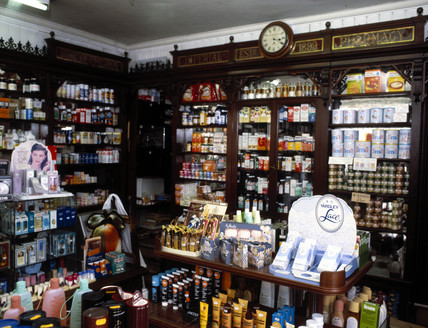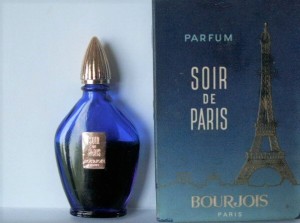3 minute read
I was fourteen when I found my first job. My mother was friendly with the local chemist, Ruta Strachowska, who was looking for a babysitter for her five-year-old boy, Paul. Mrs. S. was a middle-aged Jewish lady of about my height, with eyes that crinkled up when she laughed, which she did surprisingly often. My mother told me that she had escaped from Poland during the war by swimming across the River Dnieper to Russia at the dead of night, with Nazi soldiers shooting at her as they ordered her to stop. My mother would never have made up anything so incredible, so I believed her, but it was difficult, looking at Mrs. Strachowska’s pixie face and the dumpy figure she had now, to imagine her going for a swim anywhere.
She owned the tiny chemist’s in a row of small shops not far from our house. The bell would ring as you entered, and she’d appear from the back, where she dispensed the prescriptions. The entire place was fitted with glass-fronted cabinets from floor to ceiling. There was a small counter, with tall shelves on either side, which housed the first aid products, as well as the cold remedies, Vicks inhalant, tubes of Vaseline, and Milk of Magnesia.
Behind that, against the wall, stood a mysterious series of drawers that held all the proprietary medicines and cures not suitable for public display. Labeled A-Z, they contained, as I found, on checking them when I was bored, treatments for problems I’d never heard of. H stood for hemorrhoids, I for impetigo, and so on.
For a few months, I would baby-sit on Friday evenings. I was told to phone my mother if there were any problems. As it turned out, the little boy, Paul, was a well-behaved child who looked exactly like his mother, and had the same crinkly eyes when he laughed. He was easy to amuse, and would go to sleep right after a story, which I would read from his small, well-worn collection of books.
My employer didn’t own a television, and, although I loved to read, the silence would get to me after a while, and I would begin looking around. There didn’t seem to be many personal things in the flat above the shop. There was a snapshot of a family – mother, father and baby – and I supposed them to be related to Mrs. S somehow. It never occurred to me that it might be a younger version of her in the photo. There was no Mr. S., at least, not in evidence. When I asked my mother about it, all she would say was that he was in America, and left it at that. The word divorce was never mentioned.
Mrs. S. always told me I could help myself to whatever I wanted from the refrigerator. This was no great offer, since she had the emptiest fridge I’d ever seen. I suppose that with only two of them to feed, she didn’t need as much food as we did, with our family of seven. Even so, I would survey, dismayed, the quarter pound of cheese, the two tomatoes, the small pot of yogurt, and the four beef sausages sitting forlornly on the wire shelves, and ask myself what, in fact, I could eat without depriving Paul and his mother. There were a few useless things there, like sour cream, eggs, and several dark glass bottles of pills, but nothing a hungry teenager would fancy.
Sometimes, there would be a packet of Lincoln biscuits in the cupboard, next to the breakfast cereal, the kasha, and the matzos. I liked the matzos best. They were like gigantic water crackers, so you could nibble at just one and feel you were really eating something. I would spread them with a bit of Marmite, and enjoy the salty taste as I absentmindedly turned the pages of my latest book, or worked through some French homework.
Time would pass, as I twiddled the knobs on the front of the wireless set trying to find something to listen to. And when Mrs. S. returned, she would press two half-crowns into my hand as she found my coat for me. My allowance was only a shilling a week, so to earn five additional shillings was my first experience of unbridled riches.
When I turned fifteen, she offered me my first real job, helping out over the Christmas vacation. I was delighted. I was confident I could handle anything. The idea was that, as the pharmacist, she’d have time to make up the various prescriptions, while I sold the antacids, soap, and face creams.
On my first day as a proper employee, I spent most of my time learning where everything was. The right-hand cabinets contained all the beauty merchandise. There were the Elizabeth Arden items, of which Blue Grass was my mother’s favorite scent. I knew immediately what I would be buying her for Christmas. Further along the shelf were the products made by a company called Lenthéric. I tried on all the scents, and decided that Tweed, which came in a Donegal tweed covered box, was the most sophisticated.
 Every time I went to work, I would dab I little fragrance behind my ears and on my wrists from the tester – one never knew when a gentleman might want to kiss one’s hand. Alas, the only perfume I could actually afford was Soir de Paris, by Bourjois. The cobalt bottle with the gold pointed top came in a small matching box with a picture of the Eiffel Tower on it. So romantic!
Every time I went to work, I would dab I little fragrance behind my ears and on my wrists from the tester – one never knew when a gentleman might want to kiss one’s hand. Alas, the only perfume I could actually afford was Soir de Paris, by Bourjois. The cobalt bottle with the gold pointed top came in a small matching box with a picture of the Eiffel Tower on it. So romantic!
My boss would disappear into her upstairs office from time to time, leaving me in charge. One morning, a young man came in, but paused in mid-stride when he caught sight of me.
“Is the chemist in?” he asked in a rather strangled voice.
“I’m afraid she’s dispensing at the moment,” I said. “”May I help you?”
His eyes were darting round the various displays. I wondered if there was something wrong with him. Perhaps he was dangerous? Mrs. S. had told me to shout for her if I needed help.
“I’ll take some of these,” he said, hurriedly putting a tin of cough drops on the counter.
“And some…”
I couldn’t hear what he’d asked for.
“Pardon?” I said politely.
“Some Durex,” he said, sounding hoarse. No wonder he needed throat lozenges.
“Just a moment.”
I thought I might have seen this item in one of the drawers, and checked the one labeled D. Nothing there. But I was certain we had it.
“Mrs. S,” I yelled into the recesses of the shop. “Where’s the Durex?”
The flustered pharmacist appeared as if by magic.
“I will find,” she said, making straight for a drawer marked P.
I watched with interest. We turned together to give the customer his package. But he had vanished, abandoning the cough drops.
The minute she went back to the dispensary, I opened same drawer and began to read the labels. I’d have to look up the word prophylactic. And I could only speculate as to what those foil-packaged pills numbered from 1-30 were for. It was quite a while before I found out.

Loved this story, Gabi!
LikeLiked by 1 person
Thanks, Sonia… 🙂
LikeLike
Such a great story! You have such a great way of painting a scene. Thank you!
LikeLiked by 1 person
There are some advantages to being a woman of a certain age. One’s stories are social history. Might as well make it fun if I can!
LikeLike
Fun! We learn so much from those first jobs.
LikeLiked by 1 person
I’ll go anywhere your words lead, always a zing of a ride!
LikeLiked by 1 person
as always – superbly told!!!
LikeLiked by 1 person
Thanks, Jude!
LikeLike
Lovely story as are all of yours xxPeter G
LikeLiked by 1 person
Dear Gabi,
I searched for Ruta on Internet & came across your story. I am originally from the same Polish town as Ruta.
Ruta Strachowska was born in Grybów in Southern Poland. Her farther was Rubin Basen (born in 1886) who was an eminent lawer & philanthropist involved in charitable work within the Jewish Community. Her mother & sister were murdered together with most of the Jewish community of my town by the Natzis. It is not unclear to what happened to Ruta’s father. There is a Facebook page ‘Saga Grybow’ where the memories of Ruta’s family were discussed.
Any further information to what happened to the family would be very much appreciated – or if any of the family members would like to reach out I would be more than happy to put them in touch with one of the historians working on a project : ‘People, not numbers’.
Kind regards,
Karolina
LikeLiked by 1 person
HI Karolina – This is so interesting. I’m not absolutely sure this is the same Ruta, since Strachowska was her married name. And I think she lived in Eastern Poland before the war (She swam across the Dniepr to escape the Nazis.) Her husband survived the war too and ended up living in New Jersey, in the US. They were divorced before I knew her, and she had a son, Paul, whom you can find on LinkedIn. (He lives in Poland now) Good luck, and thanks for reaching out…
LikeLike
Dear Gabi,
Turns out that your Ruta Strachowska was indeed Ruta Besen from Grybów. Paul is already in touch with the historians in Grybów & your story partially helped to facilitate this. Example of the incredible power of Internet!
His family story & pictures were just published on Saga Grybów FB page.
All the best,
Karolina
LikeLiked by 1 person
That’s wonderful. I’m so pleased it all worked out…
LikeLike